Challenges Facing Mining in British Columbia
May 6, 2015 By Evan Pivnick 3 comments Energy and Mines, Environment, Mining, Resource Development, Social Development
Introduction
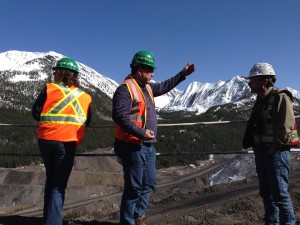 Earlier this week I published an account of my recent trip to the Kootenays where I visited a number of mining operations, and met with people in local communities. Mining is a key economic sector underpinning BC’s economy. The industry directly employs 10,720 British Columbians, contributes $8.5 billion to BC’s GDP and a further $511 million in tax revenues to provincial coffers. Numerous small communities throughout our province depend on mining for their survival.
Earlier this week I published an account of my recent trip to the Kootenays where I visited a number of mining operations, and met with people in local communities. Mining is a key economic sector underpinning BC’s economy. The industry directly employs 10,720 British Columbians, contributes $8.5 billion to BC’s GDP and a further $511 million in tax revenues to provincial coffers. Numerous small communities throughout our province depend on mining for their survival.
While we have much to celebrate about British Columbia’s mining industry, there are also a number of challenges that must be taken seriously. The BC Government has a critical role to play in ensuring that the standards that regulate this industry are kept up to date, and that in addition to the economic benefits mining provides our province, its social and environmental impacts are being accounted for seriously.
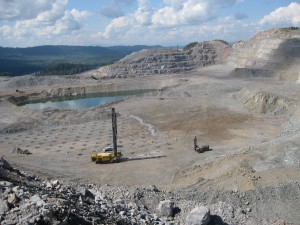 To explore some of the challenges facing this industry – and to highlight some of the solutions that are readily available, I want to turn to two specific and related issues. First, I want to explore how mines manage their tailings ponds. I will specifically look at what we have learned since the Mount Polley tailings pond breach.
To explore some of the challenges facing this industry – and to highlight some of the solutions that are readily available, I want to turn to two specific and related issues. First, I want to explore how mines manage their tailings ponds. I will specifically look at what we have learned since the Mount Polley tailings pond breach.
The second issue I will examine concerns the enforcement and regulatory functions of government and whether adequate funding is being provided by government to ensure that it is managing the environmental and social consequences of mining operations.
Impacts of the Tsilhqot’in decision
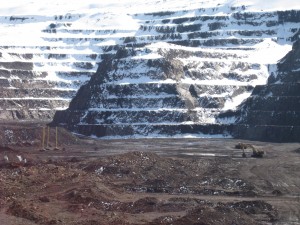 Before diving into these issues, I think it is first important to acknowledge that for the mining industry in BC to continue to succeed, and do so in way that is environmentally and socially responsible, the BC government must ensure it is addressing the requirements placed on it by the Tsilhqot’in decision. We are already seeing examples of how this decision may affect mining investment. It was announced earlier this week that the BC Government bought back 61 coal licences from a mining company in the Northwest of the province, in order to provide a longer window for the BC government to engage in more meaningful government-to-government negotiations with the Tahltan First Nation.
Before diving into these issues, I think it is first important to acknowledge that for the mining industry in BC to continue to succeed, and do so in way that is environmentally and socially responsible, the BC government must ensure it is addressing the requirements placed on it by the Tsilhqot’in decision. We are already seeing examples of how this decision may affect mining investment. It was announced earlier this week that the BC Government bought back 61 coal licences from a mining company in the Northwest of the province, in order to provide a longer window for the BC government to engage in more meaningful government-to-government negotiations with the Tahltan First Nation.
Whether or not this specific policy tool — the re-purchasing of mining licences — becomes commonly used by the BC government, the status quo of mining development is likely to change. The Tsilhqot’in decision made it clear that First Nations have significant say, if not an outright veto, over developments on their land. Last summer the Tsilhqot’in First Nation established new rules for mining development on their titled land. These rules require companies to minimize negative impacts and provide revenue sharing with the community.
Mining companies who wish to develop new mines in British Columbia will need to put an even greater focus on consulting, and ultimately addressing the concerns of not only the BC Government, but First Nations who may have inherent title rights to the land.
Learning from Mount Polley
The mining industry in British Columbia was rocked last summer when the tailings pond at Mount Polley breached its impoundment dam, and released almost 25 million cubic meters of tailings and waste water into the Hazeltine Creek, and down into Quesnel Lake.
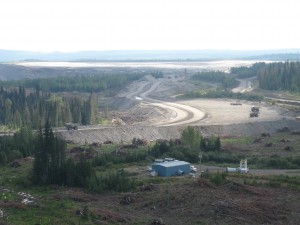 I wrote about this breach when it first happened, and after visiting the mine site and the surrounding communities, I explored in detail what had happened, and what some of the consequences were likely to be. Finally, in January of this year, the Independent Expert Engineering Investigation Review Panel published their report on the Mount Polley Breach. This Panel was empowered to investigate and report on the cause of the failure of the tailings pond facility that occurred on August 4th, 2014 at the Mount Polley Mine. In addition, they were asked to provide recommendations regarding how such an incident could be avoided in the future. It is these recommendations that I will focus on.
I wrote about this breach when it first happened, and after visiting the mine site and the surrounding communities, I explored in detail what had happened, and what some of the consequences were likely to be. Finally, in January of this year, the Independent Expert Engineering Investigation Review Panel published their report on the Mount Polley Breach. This Panel was empowered to investigate and report on the cause of the failure of the tailings pond facility that occurred on August 4th, 2014 at the Mount Polley Mine. In addition, they were asked to provide recommendations regarding how such an incident could be avoided in the future. It is these recommendations that I will focus on.
The Mount Polley tailings pond breach has shattered public confidence in government and industry ability to adequately protect the natural environment during mining operations. Regaining public trust and confidence is perhaps the greatest challenge facing the mining industry. First Nations, the Alaskan Government and Environmental groups have all raised similar concerns. How industry and government collectively respond to the Mount Polley breach will be critical in rebuilding this trust. And an ongoing examination of how mines are managing their tailings and waste, as well as a determination as to whether or not these reflect best practices, will almost certainly be one of key elements of moderating the concerns of British Columbians.
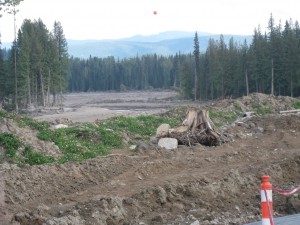 The Expert review panel touched on this point at the start of Section 9 of their report. Section 9 – entitled “Where Do We Go From Here” – explored how the BC mining industry can use best practices and best available technologies (BAT) to reduce failure rates to zero.
The Expert review panel touched on this point at the start of Section 9 of their report. Section 9 – entitled “Where Do We Go From Here” – explored how the BC mining industry can use best practices and best available technologies (BAT) to reduce failure rates to zero.
In the introduction to this section, the Panel rejected the concept of a “tolerable failure rate for tailings dams”, citing concerns that this would institutionalize failure. To quote from their report: “First Nations will not accept this, the public will not permit it, government will not allow it, and the mining industry will not survive it”.
A similar concern was voiced this week by Alaskan government, industry leaders and First Nations, who were in Victoria to meet with Minister’s regarding their concerns about the scale of development taking place in the British Columbia.
The tailings breach at Mount Polley was cited as having raised concerns about the potential impacts on the fishing industry in the region. The Alaskan delegation also felt that the review process in British Columbia was inadequate and not placing enough focus on potential cumulative impacts.
Interestingly both the Expert Review Panel and the group from Alaska pointed to the need to change the way that tailings are managed in this province.
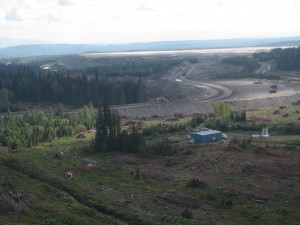 The panel established three conditions that addressed the instability that is created when mines use dual-purpose impoundments, storing both water and tailings. Best available technology would dictate that where possible these two waste products need to be stored in separate facilities that are specifically designed to prevent tailings releases. Critically, this panel also noted that economic considerations cannot be allowed to be the dominant factor in determining what is feasible – the costs of another accident far outweigh the implementation of best practices and technology.
The panel established three conditions that addressed the instability that is created when mines use dual-purpose impoundments, storing both water and tailings. Best available technology would dictate that where possible these two waste products need to be stored in separate facilities that are specifically designed to prevent tailings releases. Critically, this panel also noted that economic considerations cannot be allowed to be the dominant factor in determining what is feasible – the costs of another accident far outweigh the implementation of best practices and technology.
Following the establishment of the Best-Available-Technology (BAT), the Expert Panel made the following recommendations:
- “For existing tailings impoundments: Constructing filtered tailings facilities on existing conventional impoundments poses several technical hurdles. Chief among them is undrained shear failure in the underlying saturated tailings, similar to what caused the Mount Polley incident. Attempting to retrofit existing conventional tailings impoundments is therefore not recommended, with reliance instead on best practices during their remaining active life.
- For new tailings facilities: BAT should be actively encouraged for new tailings facilities at existing and proposed mines. Safety attributes should be evaluated separately from economic considerations, and cost should not be the determining factor.
- For closure: BAT principles should be applied to closure of active impoundments so that they are progressively removed from the inventory by attrition. Where applicable, alternatives to water covers should be aggressively pursued.”
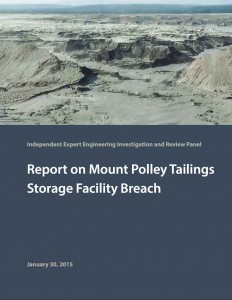 The BC Government has been somewhat responsive to this report. In mid-March they announced new interim rules for tailings ponds which would require companies seeking to build a mine in BC to include the best-available technologies for tailings facilities in their application. The Ministry of Mines are currently completing a review of mining regulations that will eventually establish the new way of doing business in BC.
The BC Government has been somewhat responsive to this report. In mid-March they announced new interim rules for tailings ponds which would require companies seeking to build a mine in BC to include the best-available technologies for tailings facilities in their application. The Ministry of Mines are currently completing a review of mining regulations that will eventually establish the new way of doing business in BC.
However in response to calls from Canadian and American groups to end the use of water based storage facilities, the Minister of Energy and Mines suggested that the expert panel’s bottom line is about reducing water storage of mine waste where you can, and reducing the risk by increasing safety factors. This statement, I fear, betrays a lack of commitment to the true underlying issue highlighted in the report – that the status quo cannot continue and that we must throw out any notion of acceptable risks. I share the frustrations of these groups that we have failed to see an open and transparent commitment to the recommendations of the Expert Report.
This process cannot be taken lightly by government. The Mount Polley breach was devastating to the community of Likely, and even today uncertainty exists as to the full extent of the environmental, social and economic costs that are faced by residents. Evidence of this uncertainty can be found in a recently research paper in Geophysical Research Letters that points to the possibility of ongoing and long-term environmental impacts from the spill on aquatic life. At the very least, long term monitoring of water and sediments in Quesnel Lake will be important.
The solutions are there — they are contained in the path forward highlighted by the Expert Panel. British Columbians deserve government to ensure that it establishes a truly credible mining regime in British Columbia, one which commands the confidence of all those who would feel its impacts. It is only under such a regime, where companies are responsible for the environmental and social impacts of their developments, that mining can be truly successful in our province.
This brings us to the second related issue facing this industry – Government’s ability to regulate and enforce the standards they set for the industry.
Professional Reliance
In 2001 after the BC Liberals were elected to their first term, they began a comprehensive core review to cut the size of government. Premier Campbell asked all government departments to prepare scenarios as to what it would look like with 20%, 35% and 50% cuts to spending. As a direct consequence of government downsizing, technical expertise within the civil service became a casualty. Instead of having technical expertise in house, the government moved towards wide scale use of Professional Reliance in the permitting process. Under the Professional Reliance approach, the Ministry relies on the judgment and expertise of qualified experts hired by a project proponent.
What is particularly important to note is that in March 2014, the Office of the British Columbia Ombudsperson released a scathing report criticizing the Professional Reliance model with respect to streamside protection and enhancement areas. The report, entitled The Challenges of Using a Professional Reliance in Environmental Protection – British Columbia’s Riparian Areas Regulation made 25 recommendations, 24 of which the government agreed to accept.
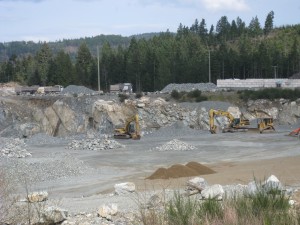 My own personal view is that the government’s approach to follow the Professional Reliance model is fraught with difficulties. The role of the government is to protect the public interest. When government is making decisions solely based on a project proponent’s expert opinion, it is very troubling. Imagine a judge in a court of law only listening to the expert opinion on one side of a case (plaintiff or defendant) and not allowing expert opinion to be submitted from the opposing side.
My own personal view is that the government’s approach to follow the Professional Reliance model is fraught with difficulties. The role of the government is to protect the public interest. When government is making decisions solely based on a project proponent’s expert opinion, it is very troubling. Imagine a judge in a court of law only listening to the expert opinion on one side of a case (plaintiff or defendant) and not allowing expert opinion to be submitted from the opposing side.
There is no doubt that mining plays a very important role in our economy. Mining provides us with the basic elements with which we have built British Colombia into a prosperous and successful jurisdiction. However, the mining industries’ importance to our economy does not disconnect it from its responsibility to conduct itself in a way the is both environmentally and socially responsible. The Expert Review panels report made it clear that the status quo is no longer acceptable and that change is needed. However, for industry to embrace this change, the BC government needs to step up to the plate. The lack of funding for the compliance and enforcement sections of our resource and environment ministries is putting us at risk of another accident. Furthermore, if we expect the mining industry to take the Expert Review panel’s recommendations seriously, we also need to be convinced that government takes them seriously as well.
Latest Posts
Recent Comments
- rory murphy on The Paris Agreement is in trouble: UNFCCC needs to ratchet up their climate efforts
- Andrew Weaver on How can BC’s environmental organizations be more effective?
- Andrew Weaver on How can BC’s environmental organizations be more effective?
- Vince Fiorito on How can BC’s environmental organizations be more effective?
- Andre Sobolewski on How can BC’s environmental organizations be more effective?

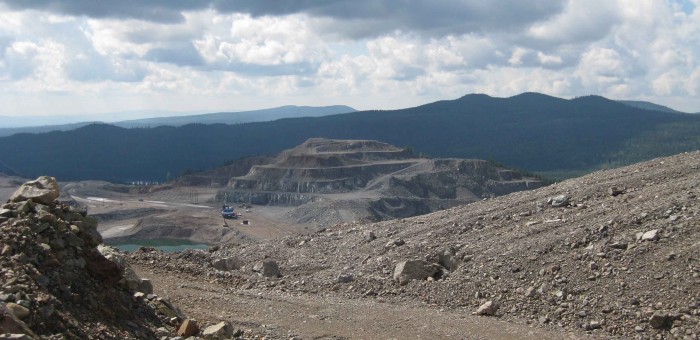



3 Comments
Until the B.C. government faces the truths regarding resource extraction in the province, there will be continued degradation of the province’s natural surroundings and its water and air quality. Ruthless profit generation has to take a backseat to protection of our environment which belongs to ALL people, and not just to the few who reap its monetary profits.
And this is the reason that the party I represent is running to form government in 2017. We understand the importance of fiscal, social and environnmental sustainability.
The closing comment says it all, “However, the mining industries’ importance to our economy does not disconnect it from its responsibility to conduct itself in a way the is both environmentally and socially responsible. The Expert Review panels report made it clear that the status quo is no longer acceptable and that change is needed. However, for industry to embrace this change, the BC government needs to step up to the plate. The lack of funding for the compliance and enforcement sections of our resource and environment ministries is putting us at risk of another accident. Furthermore, if we expect the mining industry to take the Expert Review panel’s recommendations seriously, we also need to be convinced that government takes them seriously as well.” Sent on to Bill Bennett.